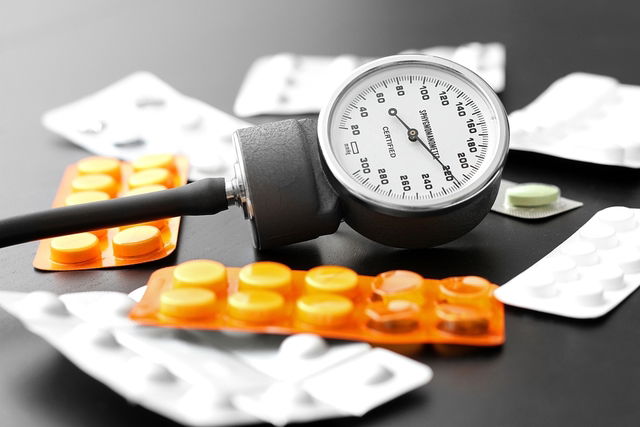Blood pressure medication are prescribed to lower blood pressure and keep it controlled. Ideally, blood pressure should be kept under 140/90 mmHg to prevent complications like heart attack, heart failure, angina, renal disease or stroke.
There are many antihypertensives that can be used to treat high blood pressure, like diuretics, beta-blockers or vasodilators. They are prescribed by the doctor on a case-by-case basis, depending on the patient, severity of the illnesses and risk for other complications. Some medications may even be prescribed as a combination.
Blood pressure medications should always be taken only as prescribed. Patients should be followed by their doctor for ongoing monitoring to ensure these medications continue to be therapeutic. To manage blood pressure, doctors should also emphasize the importance of decreasing salt intake and regular physical exercise (at least 3 times per week).

Types of blood pressure medications
The main classes of blood pressure medications that doctors can prescribe include:
1. Diuretics
Diuretics are medications that act by increasing the elimination of salt in the urine. Salt has high sodium contents that cause water retention in the body. When salt is eliminated, it brings excess water with it, which decreases fluid volumes circulating in the veins and arteries and decreased blood pressure.
There are many classes of diuretics, although the most frequently prescribed diuretics are chlorthalidone, hydrochlorothiazide, indapamide, furosemide, bumetanide, spironolactone and amiloride.
In some cases, diuretics can be used in combination with other blood pressure medications, depending on the doctor’s assessment.
2. Alpha-2 receptor agonists
Alpha-2 receptor agonists act directly on the brain to control blood pressure. These promote vasodilation to ensure blood circulates easily to reduce blood pressure.
The most common medications of this class include methyldopa, clonidine, moxonidine, and rilmenidine.
3. Adrenergic inhibitors
Adrenergic inhibitors can be broken into 2 sub-categories, beta-blockers (like propranolol, atenolol, carvedilol, metoprolol and nebivolol) and alpha-blockers (like doxazosin, prazosin and terazosin).
Beta-blockers are indicated for younger patients or for patients with a history of a heart attack. They decrease blood pressure by helping the heart to beat slower and decrease contractility, and they also help to dilate blood vessels to improve blood flow.
Alpha-blockers help to decrease blood pressure by inhibiting norepinephrine, which is a hormone that causes muscle contraction and vasodilation. By inhibiting this hormone, alpha-blockers can improve blood circulation and reduce blood pressure.
4. Vasodilators
Vasodilators act on the blood vessels by helping them to relax. This allows more space and less resistance for blood to circulate through, and also helps to reduce workload from the heart to pump blood throughout the body. The most commonly prescribed vasodilators are hydralazine and minoxidil.
Minoxidil is used as an oral treatment for high blood pressure that does not improve with other medications. It is often prescribed together with a diuretic or betablocker. This medication can also increase body hair growth, which is why it is sometimes prescribed by dermatologists in topical form to treat hair loss in
5. Calcium channel blockers
Calcium channel blockers reduce blood pressure by blocking the entry of calcium into heart cells and arterial cells. This allows blood vessels to relax and dilate, which improves blood flow and reduces workload from the heart.
The most prescribed calcium-channel blockers include amlodipine, nifedipine, felodipine, nitrendipine, manidipine, lercanidipine, levamlodipine, lacidipine, isradipine, nisoldipine and nimodipine.
Some calcium channel blockers, like verapamil and dilitazem, have the additional benefit of reducing heart rate, which can further reduce blood pressure and relieve chest pain or arrhythmias.
6. ACE (angiotensin-converting enzyme) inhibitors
ACE inhibitors reduce the production of angiotensin, a hormone that causes vasoconstriction, increases blood pressure and increases heart contractility. By blocking production, these medications promote vasodilation and reduce blood pressure.
Common ACE inhibitors include captopril, enalapril, ramipril and lisinopril, although a common side effect includes dry cough.
Angiotensin-receptor agonists are another similar class of blood pressure medications that help to reduce blood pressure by acting on the angiotensin hormone. Medications include losartan, valsartan, candesartan and telmisartan.
Side effects
Possible side effects of antihypertensives include dizziness, fluid retention, arrhythmias, headaches, vomiting, nausea, sweating and erectile dysfunction. These symptoms should be reported to your prescribed to evaluate whether dosing changes or an alternative medication is needed.
High blood pressure medications do not cause weight gain, however they can lead to swelling. In these cases, the doctor may also consider prescribing a diuretic.
When to stop taking blood pressure medication
Blood pressure medication is usually taken for the rest of your life, as high blood pressure is usually a chronic condition. Treatment is needed to reduce potential complications like heart attack, stroke, brain aneurysm or kidney failure.
These medications should be taken as prescribed and under careful monitoring of a doctor.
Read more about the most common symptoms of high blood pressure that you should report to your doctor.
Home remedies for high blood pressure
Orange juice is a great home remedy for high blood pressure, as it is rich in potassium which helps to reduce blood pressure. It also contains antioxidants that help to keep blood vessels healthy and prevent conditions like atherosclerosis, heart attack and stroke.
You should avoid consuming grapefruit juice when using antihypertensives, however, as this fruit can decrease the activity of the enzymes needed to metabolize these medications. This can lead to more side effects and even overdose.
Another great natural option is lemon juice with garlic. To prepare this juice, mix the juice of 3 lemons and 2 garlic cloves in a blender until well-combined. You can sweeten this juice as desired and drink throughout the day during meals.
Read more about home remedies for blood pressure that you can take as a complement to your prescribed treatment.
Blood pressure medication during pregnancy
Medications for high blood pressure that are safe to use during pregnancy include methyldopa and hydralazine.
Women who were already treating high blood pressure prior to pregnancy should have their medications assessed by a cardiologist, as some medications may interfere with fetal development.
